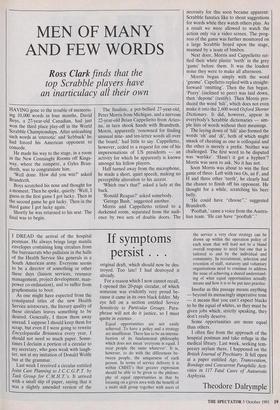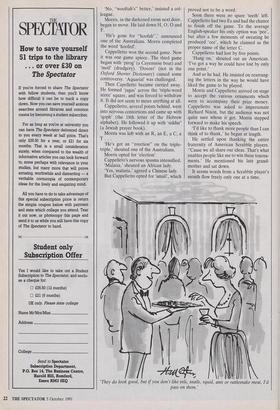MEN OF MANY AND FEW WORDS
Ross Clark finds that the top Scrabble players have an inarticulacy all their own
HAVING gone to the trouble of memoris- ing 10,000 words in four months, David Boys, a 27-year-old Canadian, had just won the third place play-off in the World Scrabble Championships. After unleashing such words as 'enzootic' and 'kebbuck' he had forced his American opponent to concede.
He made his way to the stage, in a room in the New Connaught Rooms off Kings- Way, where the comp'ere, a Gyles Bran- dreth, was to congratulate him.
'Well done. How did you win?' asked Brandreth.
Boys scratched his nose and thought for a moment. Then he spoke, quietly: 'Well, I guess in the first game I got lucky. Then in the second game he got lucky. Then in the third game I got lucky again.'
Shortly he was returned to his seat. The final was to begin. The finalists, a pot-bellied 27-year-old, Peter Morris from Michigan, and a nervous 22-year-old Brian Cappelletto from Arizo- na, in turn shook hands with Brandreth. Morris, apparently 'renowned for finding unusual nine- and ten-letter words all over the board,' had little to say. Cappelletto, however, ceded to a request for one of his impersonations of US presidents — an activity for which he apparently is known amongst his fellow players.
Half turned away from the microphone, he made a short, quiet speech, making no perceptible alteration to his accent.
'Which one's that?' asked a lady at the back.
'Ronald Reagan?' asked somebody. 'George Bush,' suggested another. Morris and Cappelletto retired to a darkened room, separated from the audi- ence by two sets of double doors. The necessity for this soon became apparent: Scrabble fanatics like to shout suggestions for words while they watch others play. As a result we were allowed to watch the action only via a video screen. The prog- ress of the game was further monitored on a large Scrabble board upon the stage, manned by a team of bimbos.
Next door, Morris and Cappelletto rat- tled their white plastic 'teeth' in the grey 'gums' before them. It was the loudest noise they were to make all afternoon.
Morris began simply with the word 'gnome'. Capelletto replied with a straight- forward 'omitting'. Then the fun began. 'Peery' (inclined to peer) was laid down, then `depone' (testify). Then Morris pro- duced the word 'hill', which does not even make it into the 2,600 word Oxford Shorter Dictionary. It did, however, appear in everybody's Scrabble dictionaries — sim- ple lists of words without their meanings.
The laying down of 'hill' also formed the words 'eh' and 'di', both of which might smack of cheating as one is colloquial and the other is merely a prefix. Neither was challenged. The first word to be disputed was 'warlike'. 'Hasn't it got a hyphen'? Morris was seen to ask. No it has not.
Soon Morris was about to win the first game of three. Left with two Os, an F, and H and three other 'teeth', he clearly had the chance to finish off his opponent. He thought for a while, scratching his beer belly.
'He could have "choose",' suggested Brandreth.
'Pooftah,' came a voice from the Austra- lian team. 'He can have "pooftah".' 'No, "wooftah's" better,' insisted a col- league.
Morris, in the darkened room next door, began to move. He laid down H, 0, 0 and F.
'He's gone for "hoofah",' announced one of the Australians. Morris completed the word 'hoofed'.
Cappelletto won the second game. Now it was one game apiece. The third game began with `pirog' (a Cayennese boat) and 'moil' (drudgery). `Doozer' (not in the Oxford Shorter Dictionary) caused some controversy. 'Aquaria!' was challenged.
Then Capelletto became carried away. He formed `jugas' across the 'triple-word score' square, and was forced to withdraw it. It did not seem to mean anything at all.
Cappelletto, several points behind, went into nervous contortions and came up with `qoph' (the 18th letter of the Hebrew alphabet). He followed it up with `siddur' (a Jewish prayer book).
Morris was left with an R, an E, a C, a 'He's got an "erection" on the triple- triple,' shouted one of the Australians. Morris opted for 'election'. Cappelleto's nervous spasms intensified. 'Malaria,' shouted an African lady. 'Yes, malaria,' agreed a Chinese lady. But Cappelletto opted for 'small', which proved not to be a word.
Soon there were no spare 'teeth' left. Cappelletto had two Es and had the chance to finish off the game. To the average English-speaker his only option was 'pee', but after a few moments of sweating he produced `cee', which he claimed as the proper name of the letter C.
Cappelletto had lost by five points.
'Hang on,' shouted out an American. 'I've got a way he could have lost by only one point.'
And so he had. He insisted on rearrang- ing the letters in the way he would have liked the game to be played.
Morris and Cappelletto arrived on stage to accept the various ornaments which were to accompany their prize money. Cappelletto was asked to impersonate Richard Nixon, but the audience was not quite sure whom it got. Morris stepped forward to make his speech.
'I'd like to thank more people than I can think of to thank,' he began at length.
He settled upon thanking the entire fraternity of American Scrabble players. "Cause we all share our ideas. That's what enables people like me to win these tourna- ments.' He mentioned his late grand- mother and sat down.
It seems words from a Scrabble player's mouth flow freely only one at a time.
'They do look good, but if you don't like eels, snails, squid, ants or rattlesnake meat, I'd
pass on them.'



















































 Previous page
Previous page